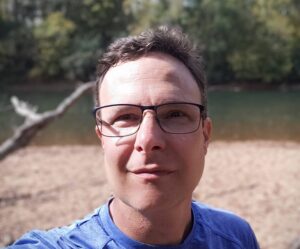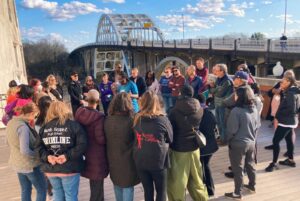Earlier this year, James Rissler and Glen Guyton embarked on a pilgrimage through civil rights sites. James reflects on how this Sankofa Journey affected his view of race relations in the U.S. and in the Mennonite church.
 James Rissler is a Mennonite pastor, living in Macon, Georgia, who most recently served as the interim pastor of Emmanuel Mennonite Church in Gainesville, Florida. He is working on his Doctorate of Ministry in Leadership through Anabaptist Mennonite Biblical Seminary, while seeking a transitional ministry position to which he can commute.
James Rissler is a Mennonite pastor, living in Macon, Georgia, who most recently served as the interim pastor of Emmanuel Mennonite Church in Gainesville, Florida. He is working on his Doctorate of Ministry in Leadership through Anabaptist Mennonite Biblical Seminary, while seeking a transitional ministry position to which he can commute.
________________________________________
Sankofa is a Ghanaian word, from the Akan tribe, that roughly translates to “to look back, to look forward.” I, along with Glen Guyton, executive director of Mennonite Church USA, recently participated in a Sankofa Journey, organized by the Evangelical Covenant Church’s Love Mercy Do Justice program. The Sankofa Journey is a pilgrimage in which one partners with a person of another racialized group to reflect together on racism, while journeying through civil rights sites in the southeast U.S. and hearing from Civil Rights Movement leaders.
I am deeply grateful for Glen’s willingness to participate in this Sankofa Journey with me. The requirement to partner with a person of a different racialized group for the journey allowed us to experience the content through the lens of our partner’s experience of race. This partnership model deeply enriches Sankofa. Glen and I were together almost continuously for 72 hours: riding the bus beside each other, visiting sites together, staying in the same hotel rooms, and engaging in dialogue about what we were seeing and thinking and feeling throughout. Our conversations with other participants were also extraordinarily enriching.
One of the most striking things that Glen shared with me is that, while he considers himself an Anabaptist, he sometimes still doesn’t feel fully “Mennonite.” This saddens me. There is value in our Swiss German or Russian cultural heritage, which Glen celebrates. Both of us know people who consider themselves Mennonite atheists, but their Mennonite cultural identity is still meaningful to them. Yet, even after serving and leading the Mennonite church in a variety of capacities over three decades, Glen also still feels that this European cultural heritage is an external barrier to him being fully considered a Mennonite.
I wonder if we need to pay more attention to how we think about and communicate what it means to be Mennonite.

Sankofa Journey participants gather with Charles Black and Lula Joe Williams in the sanctuary at New Life Covenant Church, where the journey began. Charles led sit-ins to integrate restaurants in Atlanta, and Lulu Joe was the first female field worker with SCLC
How can we emphasize our theology and witness to the world in ways that make it less likely for people to ask this question, which Glen and I received one evening over dinner with another pair of Sankofa pilgrims: “Forgive me for asking, but can a Black man lead the Mennonite church?”
While I am deeply grateful for the insights that Glen shared with me, I also need to clearly state that white folks cannot expect this kind of accompaniment nor wait to be taught by people of color before working to become more aware of the ways in which our society continues to privilege white people at the expense of people of color. Glen’s participation was a wonderful gift to me, as was the participation of every other person of color to their white partners. White folks need to continue to read and reflect and talk with other white people about the continued enmeshment in racist systems, in an attempt to better understand how to be allies in transforming our culture to better reflect God’s shalom.
The Sankofa Journey deepened my sense that I cannot allow myself to opt out of confronting and engaging racism. Of course, as a white person, I can opt out in ways that people of color cannot. It is precisely because they cannot that I shall not. I cannot allow myself to let a racist trope go unnamed in conversations with other white folks. I need to actively look for opportunities to share about our history and continued inequities in conversations in which doing so might help others understand the ways in which our society is still far from equitable. I need to have uncomfortable conversations with my friends and acquaintances.
As one of our Black tour leaders said, “If you’re not uncomfortable, you’re not living in solidarity. I don’t know what you’re doing, but it’s not living in solidarity.”

Sankofa Journey participants gather at the base of the Edmund Pettis Bridge in Selma, Alabama.
Of course, we all need to listen deeply to whomever we engage with, in order to hear what might connect with them. There are certainly times to name and decry injustice, but the harder calling, at least for me, is to gently engage those who have expressed racist or white nationalist views, with the hope of finding some small way of helping them recognize the hurtfulness of their views. Can I do this as I fear their reaction or the effect it might have on our relationship, remembering that my fear is small in comparison to the harm my Black and Brown friends could experience? Can I do this in love, even as I am angry, remembering that my anger pales in comparison to the hurt my siblings in Christ have experienced?
This Sankofa Journey was part of my work on intercultural competence for my Doctor of Ministry in Leadership program that I am doing through Anabaptist Mennonite Biblical Seminary. I hope that I am growing in intercultural competence. But my deeper prayer is simply that I might enter spaces in which mine is not the dominant culture, with a posture of humility and a desire to learn. No matter how much I learn, I need to maintain that posture of humility and openness, because I will continue to say ignorant things that will offend. When I do, I need to receive correction with humility, apology and a desire to learn, rather than respond with defensiveness. This is especially true when that correction comes from people of color.
This Sankofa experience, in which diversity was married with challenge, deep listening, and grace, was beautiful. I wish that more of the spaces I inhabit reflected this gracious care to grow together toward justice, while honoring our diverse experiences. Mennonite Mission Network is now leading Civil Rights Pilgrimages. Might joining one of these be a way for you to deeply and humbly reflect about race on our long journey together toward a church and society that reflects God’s beautiful shalom?
The views and opinions expressed in this blog belong to the author and are not intended to represent the views of the MC USA Executive Board or staff.
Interested in submitting a blog for Menno Snapshots? Please see our blog guidelines here.

